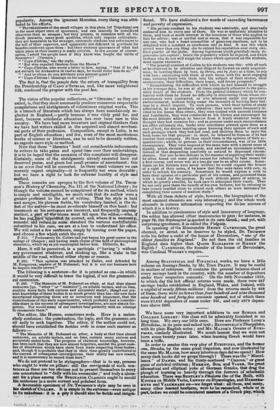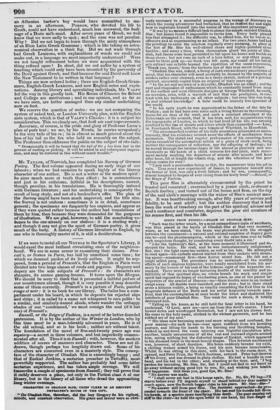We have some very important additions to our Sonoor, and
COLLEGE LIBRARY: this class will be admirably furnished in no long time. We envy our little ones. Here are Professor Lolen's Herodotus, in its pure and naked text; BLOOMFIELD'S Thucydides, with its plain English notes ; and Mr. Maeon's Orestes of EURI■ PHIES, similarly illustrated. We much lament that we were not born some twenty years later, when learning Greek would have been a trifle.
In order to master this very play of EURIPIDES, and the former one, Hecuba, by the same great tragedian, and now illustrated by the same Mr. MAJOR, how many laborious days did we spend ! How many dark books did we grope through! There was the " Miscel- lanea " of Daveas, and his thinly-scattered " Canons;! or great Funs of metrical "criticism; HERMAN, Dos, -and VIGERa. the-great Aliomatioal and elliptical yoke of German Greeks, that drag the ;plough of leaning so heavily through the. -furrows of scholastic '..education. There was BENTLEY'S Rhalaseis (he -of the Bull), ?Atli Kusreit on Middle Verbs, LENNEP on Etymologies, and HEMSTilt- tikrirs and Verkarrazi-onee forget-what :. all these, and many, many 'Other -learned heathiens, were to-be ransacked, whole or in. part, before we could be considered mate* ofa Greek play, WhiCh e • an Athenian barber's boy would have committed to me- mory in an afternoon. PORSON, who devoted his life to Greek, could not have understood, much less answered, the badi- nage of a Doric milk-maid. After seven years of Greek, we well know that we were sadly. to seek ; and the case was not peculiar. Why ? Did we not begin to learn through the misty atmosphere s)f an Eton Latin Greek Grammar ; which is like taking an astro- nomical observation in a thick fog. Did we not wade through bad Greek Lexicons, with explanations of words we could not make out, in a language we most imperfectly understood ? Were we not taught refinement before we were acquainted with the thing refined upon ? In short, did we not suffer by a system of teaching which could only have been invented by the perversity of the Devil against Greek, and that because the said Devil well knew the New Testament to be written in that language ?
Things are now ordered better; there are English-Greek Gram- mars, English-Greek Lexicons, and now English notes and expla- nations. Among literary and speculating individuals, Mr. VALPY led the way in this goodly task. His Series of Classics for School and College are meritorious ; and in our opinion, and as far as we have seen, are better managed than any similar undertaking now on foot.
We reserve the question of notes: we are not comparing the system of naked text, or London University plan, with the English note. system, which is that of VALPY'S Classics : it is a subject for consideration. This we clearly see, that both are vast improvements. Accuracy, of course, is the pride and glory of Professor Limn's plan of pure text ; we see, by his Errata, he carries scrupulosity to the very tails of his rs ; he is almost as much grieved about the loss of his tail as the fox who held an assembly on the subject. The Professor thus addresses the public on the subject of rho-tails : " Occasionally it will be found that the tail of the e has been lost in the process of casting or picking. It will be added in any subsequent impres- sion, and may be restored in this without much trouble."



























 Previous page
Previous page